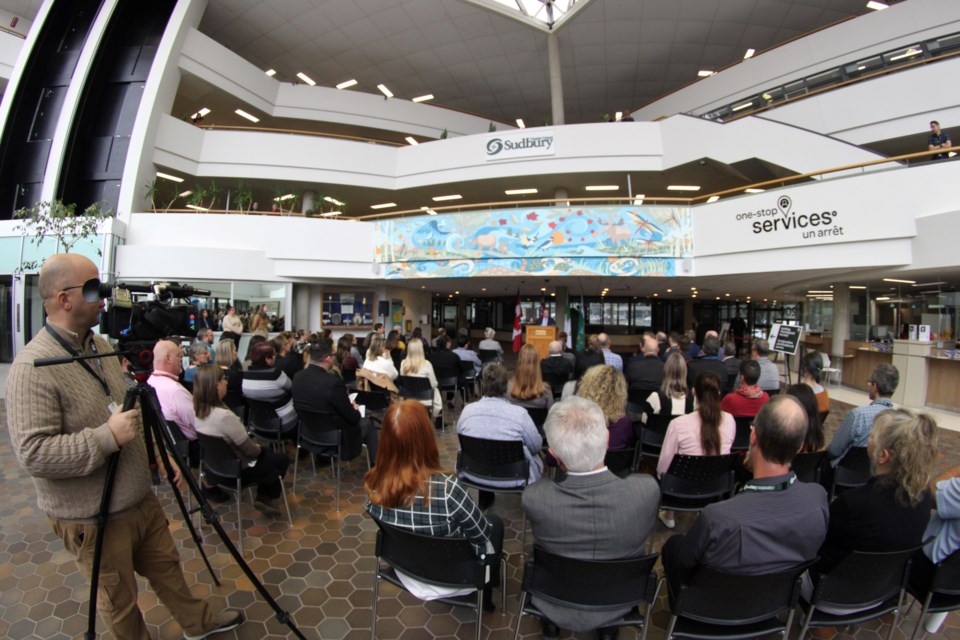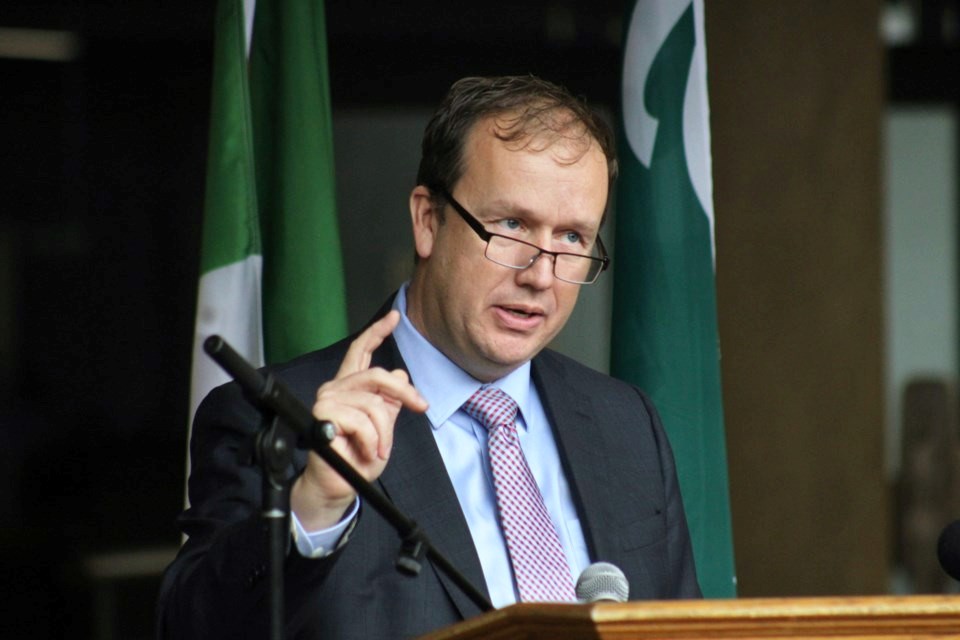“We are challenged, as a city, when it comes to our infrastructure,” Mayor Paul Lefebvre told Sudbury.com following his Oct. 24 speech at city hall highlighting council’s first year in office.
“Big city, low density; that’s the challenge that we have, so how do we address that and try to keep the tax rate as low as we can, provide good services, as well as having modern facilities?”
“How do you?” Sudbury.com asked.
“You tell me,” he answered with a laugh.
Lefebvre expanded on this point, noting it’s a “year-by-year” process with staff and keeping city council’s eye trained on economic development and infrastructure renewal.
“We need to do this over many years, we can’t do this in one year,” he said.
In many ways, Lefebvre’s Oct. 24 speech echoed the 100-day speech he delivered in February, at which he also focused on economic development as one of the current city council's priorities.
His inaugural State of the City address in April reiterated this idea, at which he announced the creation of a task force to tackle labour attraction to meet his goal of reaching a population of 200,000 by 2050.
With his overall goals remaining the same, Lefebvre’s Oct. 24 speech was a partial retread of previous comments, with updates on what city council has been working on since that time. He also drew a direct parallel between economic development and the city’s infrastructure gap.
Earlier this year, a municipal report noted that the city’s current annual spending gap to maintain assets in their current overall state is at least $103.3 million, which doesn’t account for everything. Following their current funding trend, Greater Sudbury roads are slated to slip from their overall “fair” condition to “poor” by 2030.
“Greater Sudbury is an amalgamated city with many communities and a sprawling legacy of aging infrastructure to maintain. We have a massive infrastructure across the city with a large service area to cover,” Lefebvre told his Oct. 24 audience, adding that the city has 3,600 road lanes, which could stretch to Mexico.
“And our staff have to maintain that,” he said.
With 14 arenas ranging in age from 30 to 73 years, a collection of five pools of at least 40 years old, and the city’s 24 emergency service stations also getting long in the tooth, Lefebvre said there are no lack of infrastructure challenges in Greater Sudbury.
The city has been addressing some of these infrastructure needs by looking at a new downtown arena to replace the 72-year-old Sudbury Community Arena, dusting off the city’s Arena Renewal Strategy and reviewing its collection of aquatics facilities. The city also plans on amalgamating and modernizing its emergency service stations in future budgets, and have a new library/art gallery project proposed to take shape at city hall, which would replace the downtown municipal library.
These projects all cost money.
“My plan to increase our population to 200,000 is because we need to increase the tax base to help pay for its modernization,” Lefebvre said. “Otherwise, we will continue raising the tax rate of our existing population higher than anyone wants.”
Past city councils have kept tax rate increases low, in some cases by taking money from reserves and capital funds to subsidize operational costs.

“The bill was always going to come due,” he said. “We are paying for it now in the form of aging public assets and deferred maintenance to our facilities, all within the context of rising interest rates and a depleted reserve fund that was supposed to be set aside for a rainy day.”
The city has taken on multi-year budgeting to better plan for longer-term infrastructure renewal, Lefebvre noted, while city council has also asked the city’s auditor general to review their procurement policies.
Expanding the tax base through economic development will be key to filling the infrastructure gap, Lefebvre said, citing the Housing Supply Strategy to be completed in mid-2024 and the ongoing work of the Future-Ready Development Services Ad-Hoc Committee as two examples of forward momentum.
A key piece of the puzzle is situated downtown, he said, citing the proposed arena and library/art gallery projects as aiding in downtown revitalization, which will help spur private investment.
“I believe that every growing, vibrant, attractive city needs a central area that provides a concentration of arts, entertainment, hospitality, where people can congregate,” Lefebvre said.
“The city has to do its part in its revitalization if it expects others to want to invest in it.”
Greater Sudbury city council’s next big hurdle will be 2024 budget deliberations, which will begin after city administration tables their draft budget on Nov. 15.
The draft budget is slated to come in with a 4.7-per-cent tax levy increase, which will require administrators to cut $10.5 million from the city’s base budget to accomplish.
From there, budget deliberations will include a proposal to add an additional 1.5 per cent to the tax levy to help pay for infrastructure needs.
“We need to have a plan to address (infrastructure needs) and that’s what council is trying to do,” he told Sudbury.com, adding that although the final budget will be up to city council as a whole, he doesn’t want to see it draw from reserves or neglect the city’s aging infrastructure.
Tyler Clarke covers city hall and political affairs for Sudbury.com.
